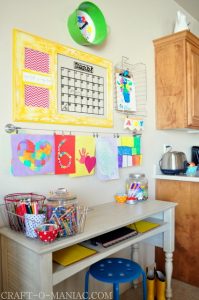Time for the Right Brain to Shine

School has definitely changed these last couple weeks. The good news is that our right brain thinkers may have a new opportunity to show what awesome learners they really are! Hopefully, they do not have to sit still and listen to their teachers lecture. Instead, they are given online games, chances to listen to a book being read by a celebrity and choices about how they can demonstrate their learning.
This is not to say that this is going to be easy. You will still have to reign them in when it comes to setting up a schedule to get their school work finished. You will still have to check in on whether or not they are conveying the learning they are supposed to be and completing the assignments. But, there is so much flexibility in when, where and how they can demonstrate their learning.
Adapt these tips for relieving the overwhelm of homework to help your right brain thinker both stay on task and learn to love this new school set up.
- Set up a schoolwork spot. A predictable, steady place to do schoolwork is a big part of a successful routine. Make sure it’s a good spot for feel good kind of focus. Be sure to have fresh pencils, pens, and paper nearby. Eliminate the obvious distractions and get down to work.
Make a schedule and list. Once you’ve reviewed the day’s schoolwork, help your child make a list. Keep it short, simple and visual! Having a list will help them focus and give them a sense of accomplishment as they check things off.
- Use color for organizing their school work and taking notes. Visual kids love color and their brains remember things how look and color is a big part of that. Let them use different colored gel pens for taking notes, colored highlighters when reading and different colored folders for each subject.
- Sit and work with them. You are probably working from home now too. Both of you will stay better focused with a partner nearby. Once you know they understand the assignment, fade to the background and let them carry on. Don’t be overly helpful or do the work for them. Just be nearby to answer questions or provide help when needed.
- Shorter working sessions are far more effective for right brain kids. Kids also remember more when hearing it or practicing in several shorter sessions rather than one long one.
- Allow frequent movement breaks to give the brain a chance to process the information. While taking those breaks between study sessions, get them moving. Our right brain kids need to get their whole body involved in what they’re doing. Have them shoot hoops, or do a few laps around the block or get their dance moves on before they head back to the books.
- Talk casually over a snack or meal between tasks. Kids need to let off a little steam in between assignments. Talking casually about what kind of work needs to be finished, can take the edge off and get the juices flowing in a fun positive way.
- Allow doodling or drawing during homework. Right brain kids often need to write or draw out what they’re thinking about. It even helps for them to take visual notes. Doodling can help your right brain learner work out those math problems or science concepts. Just watch time spent doodling doesn’t pull them away from doing the actual assignment.
Using manipulatives can make learning more real for right brain kids. These learners need ways to make concepts more real. Try using Scrabble® tiles for spelling words or M&M’s® for math.
- Remove distractions. This is good for everyone involved. You may be used to having to work through lots of distraction and they may think it doesn’t bother them, but it does. Get them working in a spot that’s as quiet as possible. No pets, baby sisters or television on in the background.
- Try adding music. Some background noise can help minimize the natural sounds of home, but let’s not have the radio blaring or the latest music videos streaming. Be intentional about creating a mood for focus and concentration with neutral background sounds or classical music. Background noise without words may help your child focus better than complete silence.
- Read aloud. Right brain kids might resist reading whenever they can. So, whether it’s reading informational text, a reading assignment or reading the instructions in an assignment; reading it out loud helps the child connect with what they’re reading.
- Do larger projects in stages. Talk over those big assignments and make a plan. Break the assignment into several smaller pieces and do a little each day. This lessens the chance of your right brain kid feeling overwhelmed and enables them to be successful one smaller bite at a time.
Watch the Movie-For older students with serious reading ahead, it may help to watch the movie first. Many novels have been made into high quality movies and watching before reading is a great way to engage your child and help them understand the story and characters.
- Read the same book at the same time. For older elementary kids through high school, reading the same book they’re reading can help you help them. The shared experience of reading the same story and talking about it, increases comprehension and builds their interest in reading.
- Cliff Notes. There are times our right brain kids need extra help reading books. For books that are heavy duty and extra intimidating, reading the Cliff’s notes before the book can lighten the load. Yes, we want them to read the actual book, but reading the cliff notes first can make it more approachable.
- Read papers out loud. Writing assignments can be much improved when kids read their papers out loud. Reading silently allows the writer to slide over detail and poor sentence structure. Reading aloud helps them hear what they wrote and makes them better able to correct mistakes in wording and content.
- Watch a video. Any learning can be enhanced by seeing or hearing more about it. There is a tremendous amount of content available in video format. Whether it’s a documentary, television show or You Tube video, search out the topic your child is studying in class and spend some time watching some quality, age appropriate videos.
- Make it fun. More than anything, do what you can to make homework time fun. Keep it light. Take snack breaks. Dance breaks. Create games to study sight words. Get cooking to study fractions. Use props to act out history lessons. The possibilities are endless.
I am sure you have found some life hacks of your own. Comment below and share your ideas for surviving and adapting to our current state.









 Make a schedule and list. Once you’ve reviewed the day’s schoolwork, help your child make a list. Keep it short, simple and visual! Having a list will help them focus and give them a sense of accomplishment as they check things off.
Make a schedule and list. Once you’ve reviewed the day’s schoolwork, help your child make a list. Keep it short, simple and visual! Having a list will help them focus and give them a sense of accomplishment as they check things off. Using manipulatives can make learning more real for right brain kids. These learners need ways to make concepts more real. Try using Scrabble® tiles for spelling words or M&M’s® for math.
Using manipulatives can make learning more real for right brain kids. These learners need ways to make concepts more real. Try using Scrabble® tiles for spelling words or M&M’s® for math.  Watch the Movie-For older students with serious reading ahead, it may help to watch the movie first. Many novels have been made into high quality movies and watching before reading is a great way to engage your child and help them understand the story and characters.
Watch the Movie-For older students with serious reading ahead, it may help to watch the movie first. Many novels have been made into high quality movies and watching before reading is a great way to engage your child and help them understand the story and characters.
